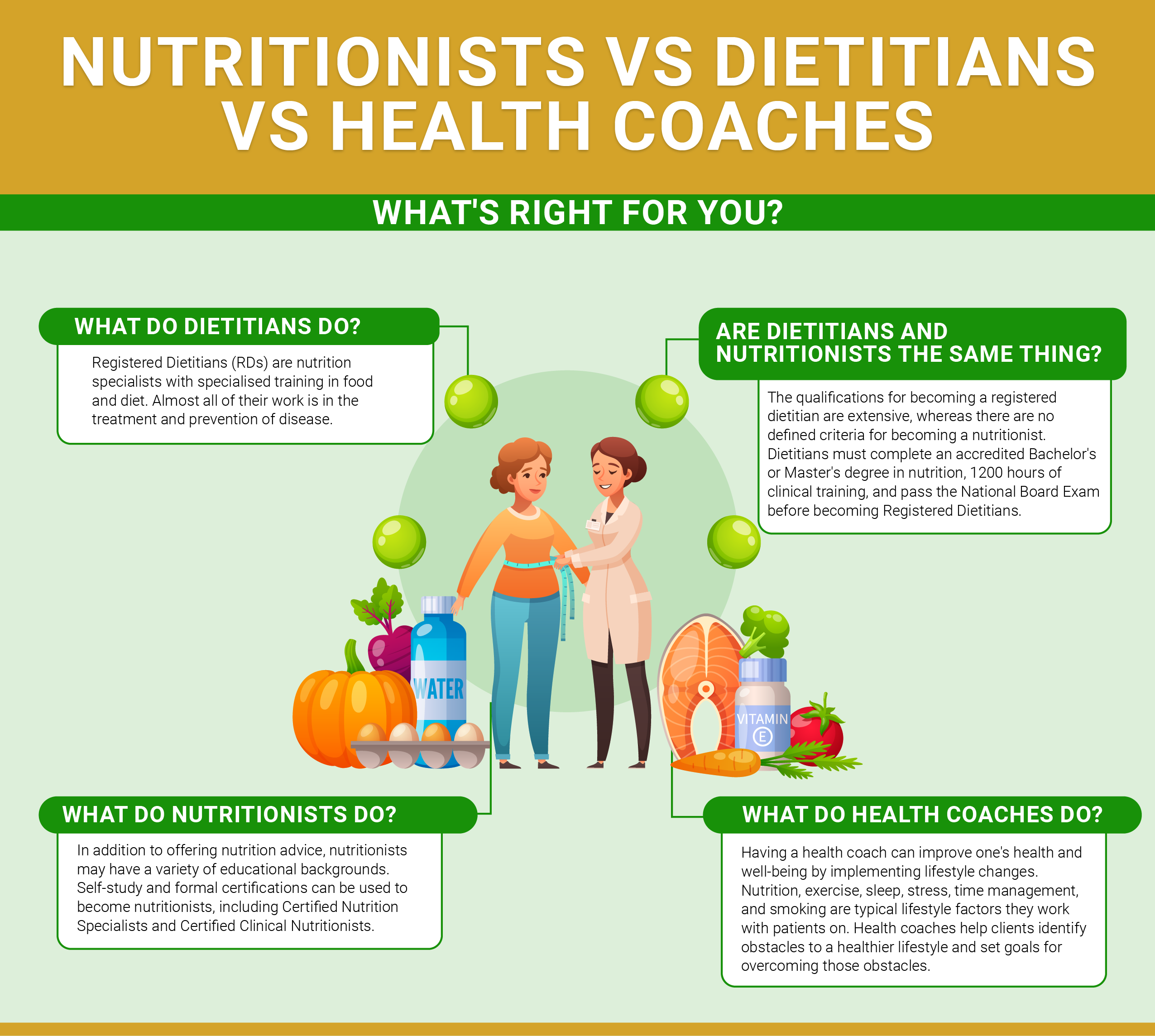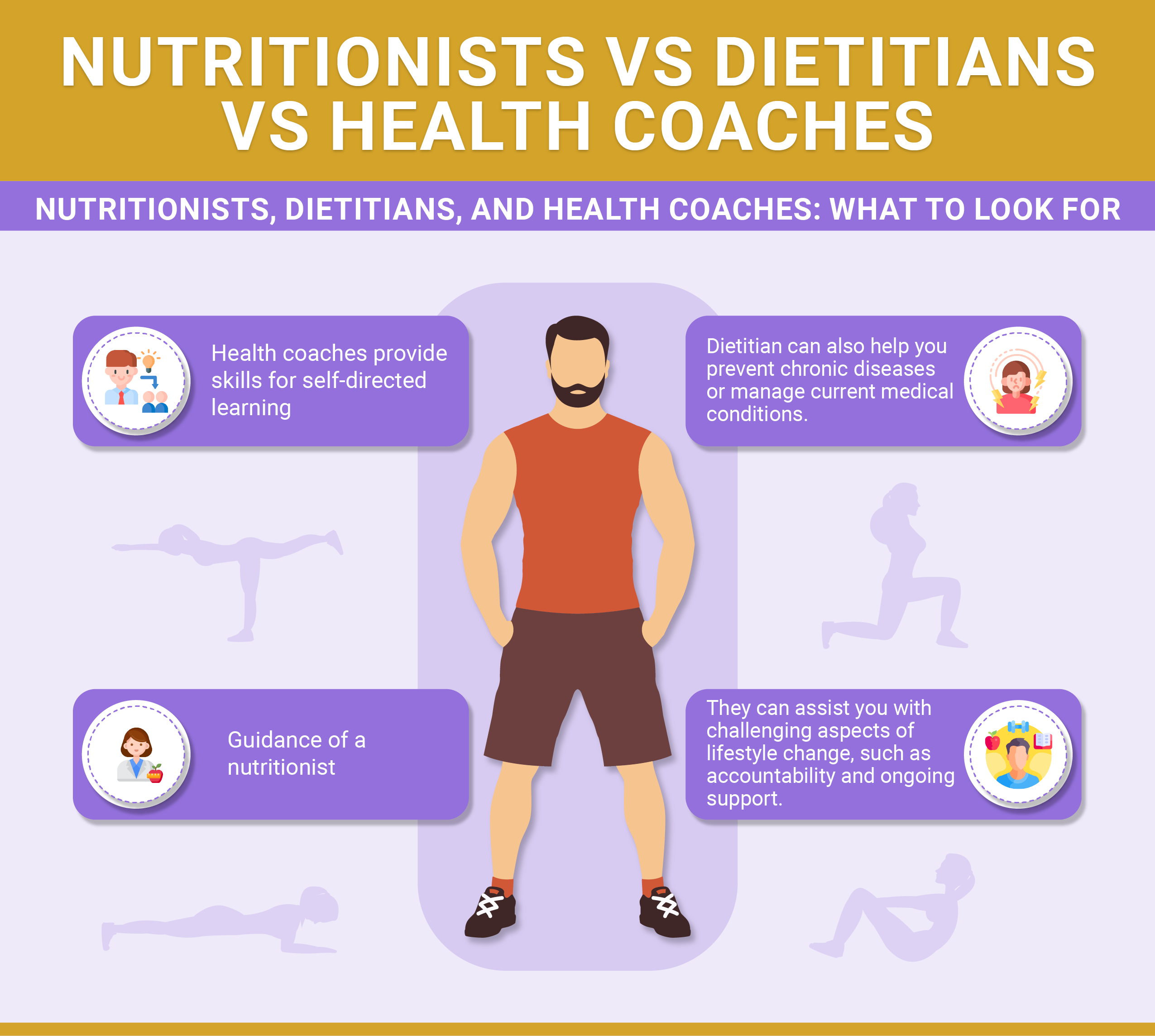Healthy habits take a lot of work to build. Furthermore, a wealth of information is available to us about how to take better care of ourselves - what and when to eat, what type of exercise is best, how to improve sleep, become a morning person, how to practice mindfulness, and so on. A professional can help you with healthier habits, especially ones that could help you lose weight if you feel overwhelmed by your Google search results. It can still be confusing even then! How do Nutritionists, Dietitians, and Health Coaches differ? Let's examine the differences and see how they can benefit you.

Registered Dietitians (RDs) are nutrition specialists with specialised training in food and diet. Almost all of their work is in the treatment and prevention of disease. They have completed advanced training and education in nutrition. Dietitians are frequently found working in healthcare organisations, but they are also found working in academic institutions, food-related businesses, and research.
The role of RDs within healthcare organisations is to provide medical nutrition therapy, which involves making dietary recommendations tailored to the person's condition or disease. Various conditions can contribute to this, including obesity, diabetes, heart disease, and gastrointestinal problems. In addition to taking into account factors like health history, medications are taken, and lifestyle, RDs apply knowledge of nutrition and physiology to provide specific recommendations for their patients.
RDs are an excellent resource for those wanting to lose weight. Changing the number on the scale means talking to a food expert because nutrition plays an important role in weight loss. In addition, registered dietitians can obtain advanced training and board certification in weight management. It includes research on the most effective ways to lose weight, emphasising behaviour change as part of education. Through research and training, Registered Dietitians provide the best-individualized guidance on weight loss and, more importantly, on improving your overall health. Additionally, you will receive the ongoing support and accountability needed on any weight loss journey from a Registered Dietitian.
In addition to offering nutrition advice, nutritionists may have a variety of educational backgrounds. Self-study and formal certifications can be used to become nutritionists, including Certified Nutrition Specialists and Certified Clinical Nutritionists.
Weight loss can be assisted by a nutritionist who provides you with general guidelines on healthy eating habits. Your doctor may ask you to record your food intake or give you a meal plan. Like a Registered Dietitian, they can meet with you regularly to support and hold you accountable as you strive to change your eating habits.

These words are often used interchangeably in society but have quite different meanings. The qualifications for becoming a registered dietitian are extensive, whereas there are no defined criteria for becoming a nutritionist. Dietitians must complete an accredited Bachelor's or Master's degree in nutrition, 1200 hours of clinical training, and pass the National Board Exam before becoming Registered Dietitians. To practice in a particular state, they are often required to be licensed by a state board. Maintaining their certification also involves continuing education requirements so they know the latest research on nutrition and diseases. To call themselves nutritionists, they do not have to complete specific training or certification. A dietitian is a nutritionist, but not all nutritionists are dietitians, according to the Commission on Dietetic Registration.
Having a health coach can improve one's health and well-being by implementing lifestyle changes. Nutrition, exercise, sleep, stress, time management, and smoking are typical lifestyle factors they work with patients on. Health coaches help clients identify obstacles to a healthier lifestyle and set goals for overcoming those obstacles. Corporate wellness programs, healthcare organisations, or individuals can hire health coaches as part of their wellness programs. Because health coaches are not required to have specific training or education, it can be challenging to determine their credentials. To become a certified health and wellness coach, you must complete a specific training program and pass an exam administered by the National Board for Health and Wellness Coaching. Identifying your barriers to weight loss is one of the most important aspects of working with a health coach when you are trying to lose weight. Even though they aren't considered food and nutrition experts, they can assist you in finding out why your eating habits could be healthier. You can make self-directed changes with the help of a health coach, depending on your personal goals and values. Additionally, they can assist you in maintaining weight loss changes through ongoing support and accountability.
The chances of success in your weight loss journey increase when you seek professional help. Think about your needs before selecting one of these three professionals. In addition to providing accountability, health coaches provide skills for self-directed learning but do not necessarily have nutrition expertise. You might benefit from the guidance of a nutritionist if you need help with proper nutrition. Besides providing proper nutrition and understanding how what you eat affects your health, a Registered Dietitian can also help you prevent chronic diseases or manage current medical conditions. You can feel confident that a Registered Dietitian is up-to-date on the latest research and provides research-based advice. Additionally, they can assist you with some of the most challenging aspects of lifestyle change, such as accountability and ongoing support.
Registered Dietitians at Weightloss Coach provide a comprehensive approach to weight management as part of a medical team. To create a personalised weight loss plan with nutrition, physical activity, mindset shifts, and approved medications, Weightloss Coach patients work with a Board Certified Doctor and a Registered Dietitian with board certification in obesity and weight management. You can lose weight and improve your overall health with our insurance-covered medical weight loss program. Check out our medical weight loss quiz today to learn if it's right for you. Have questions? Get in touch with an enrollment specialist for a free consultation.

Comments